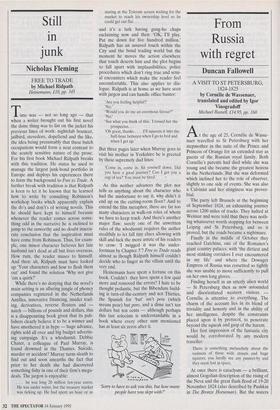Still in junk
Nicholas Fleming
FREE TO TRADE by Michael Ridpath Heinemann, £10, pp. 345 Time was — not so long ago — that when a writer brought out his first novel the done thing was to list on the jacket his previous lines of work: nightclub bouncer, jailbird, stevedore, dopefiend and the like, the idea being presumably that these butch occupations would form a neat contrast to the acutely sensitive nature of the prose. For his first book Michael Ridpath breaks with this tradition. He states he used to manage the largest junk-bond portfolio in Europe and deploys his experiences there to form the background to Free to Trade. A further break with tradition is that Ridpath is keen to let it be known that he learned how to write by consulting Robinson's workshop books which apparently explain the do's and don't's of writing novels. This he should have kept to himself because whenever the reader comes across some- thing odd in the narrative he is inclined to jump to the unworthy and no doubt inaccu- rate conclusion that the inspiration must have come from Robinson. Thus, for exam- ple, one minor character believes her late husband isn't dead at all but lives overseas. How rum, the reader muses to himself. And then: ah, Ridpath must have looked up 'Your characters and how to flesh them out' and found the solution 'Why not give 'em a quirk?'
While there's no denying that the novel's main setting is an alluring jungle of phoney companies registered in the Netherlands Antilles, innovative financing, insider trad- ing, derivatives, reverse floaters and — natch — billions of pounds and dollars, this is a disappointing book given that its pub- lishers clearly believe it to be a winner and have smothered it in hype — huge advance, rights sold all over and big budget advertis- ing campaign. It's a whodunnit. Debbie Chater, a colleague of Paul Murray, is found drowned in the Thames. Suicide, murder or accident? Murray turns sleuth to find out and soon unearths the fact that prior to her death she had discovered something fishy in one of their firm's mega- deals. The jargon is enjoyable:
. . . he was long 20 million ten-year euros. He was under water, but the treasury market was ticking up. He had spent an hour or so
staring at the Telerate screen waiting for the market to reach his ownership level so he could get out flat.. .
and it's a lark having gung-ho chaps exclaiming now and then: 'OK, I'll play. Put me down for five hundred million.' Ridpath has an assured touch within the City and the bond trading world but the moment he moves the action elsewhere that touch deserts him and the plot begins to fall apart with implausibilities, police procedures which don't ring true and sexu- al encounters which make the reader feel uncomfortable. This also applies to dia- logue. Ridpath is at home as we have seen with jargon and can handle office banter:
`Are you feeling helpful?'
'No.'
'Would you do me an enormous favour?' 'No.'
'See what you think of this.' I tossed her the prospectus.. .
'Oh great, thanks . . . I'll squeeze it into the half-hour between when I go to bed and when I get up.'
But three pages later when Murray goes to visit his mother in Yorkshire he is greeted by these supremely dud lines: 'Come in, come in. Sit yourself down. Did you have a good journey? Can I get you a
cup of tea? You must be tired.' •
As this neither advances the plot nor tells us anything about the character who had the misfortune to say it, why didn't it end up on the cutting-room floor? And to extend the film metaphor, there are far too many characters in walk-on roles of whom we have to keep track. And there's another major flaw: surely one of the unwritten rules of the whodunnit requires the author stealthily to let fall tiny clues allowing with skill and luck the more astute of his readers to crow: 'I twigged it was the under- footman by Chapter 5'? Free to Trade reads almost as though Ridpath himself couldn't decide who to finger as the villain until the very end.
Heinemann have spent a fortune on this book. Couldn't they have spent a few quid more and removed the errors? I hate to be thought pedantic, but the Bibendum build- ing is turn-of-the-century and not Thirties, the Spanish for 'but' isn't pera (which means pear) but pero, and a dime isn't ten dollars but ten cents — although perhaps this last solecism is understandable in a book where every other sum mentioned has at least six zeros after it.
`Sony to have to ask you this, but how many people have you slept with?'









































 Previous page
Previous page